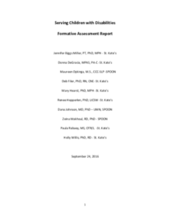This document provides a formative assessment on the state of children with disabilities in Zambia.
The formative assessment aimed to answer three fundamental questions. First, can the quality of life of children with disabilities living in institutions be improved? Second, what are the conditions of children with disabilities living in community? If excellent, how can those conditions be supported and expanded? If poor, how can the quality of life of children with disabilities and their families be improved? Third, are there effective strategies that can be implemented and disseminated nationally to assure good quality of life for children with disabilities?
The formative assessment was completed by an inter-professional team in June, 2016. The assessment found Institutions where children with disabilities reside can be improved. Providing adequate nutrition and rehabilitative strategies could significantly improve children with disabilities’ quality of life. The conditions for children with disability in the community vary based on the type of disability. Regardless, children with disabilities and their parents living in the community face substantial stigma and isolation. Transportation becomes a barrier – both in terms of accessibility of the transportation, the size of the child, availability of equipment that supports mobility (i.e wheelchairs) and the amount of time it takes which further restricts employment. Community‐based rehabilitation is operational in several areas in Zambia. The approach not only brings services to families in the community, it provides an opportunity for children to reach their potential and has been effective in reducing stigma.

